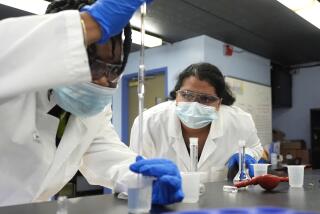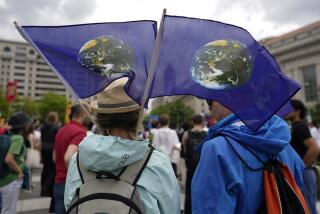Militants’ fiefdom is liberated
For more than a year, hundreds of masked gunmen loyal to Al Qaeda cruised this capital of their self-declared state, hauling Shiite Muslims from their homes and leaving bodies in the dusty, trash-strewn streets.
They set up a religious court and prisons, aid stations and food stores. And they imposed their fundamentalist interpretation of Islam on a population that was mostly too poor to flee and too terrified to resist.
U.S. and Iraqi soldiers last week pushed into this city that has been the heart of the Sunni Arab militants’ fiefdom, in a campaign to bring three lawless neighborhoods under government control. What they found was a chilling indication of the ability of Sunni Arab insurgents to run a rival state, even as U.S. troops prepared to wipe them out.
U.S. and Iraqi troops say they have captured, injured or killed about 150 of the militants since the assault began last Tuesday. But they acknowledged Monday that they had found no top Al Qaeda in Iraq leaders, and speculated that 100 to 350 militants had fled ahead of the offensive, which involved 10,000 troops.
But U.S. Army Col. Stephen Townsend, who commands the 3rd Stryker Brigade Combat Team, 2nd Infantry Division, based in Ft. Lewis, Wash., said the assault had denied the insurgents a major bastion and helped secure this city of about 300,000 residents.
“There ain’t no capital of the Islamic State of Iraq anymore,” Townsend told reporters Monday at a base on the city’s northern outskirts.
The Islamic State of Iraq is a loose coalition of insurgent groups, including Al Qaeda in Iraq, that professes loyalty to Osama bin Laden. It claims authority over Sunni Arab-dominated parts of the country, and chose as its capital this sprawling and lawless city surrounded by farmland and palm groves about 35 miles northeast of Baghdad. Abu Musab Zarqawi, the leader of Al Qaeda in Iraq, died in a U.S. airstrike just outside this city last June.
Evidence of the group’s reign included an interrogation center with knives and saws, its walls peppered with bullet holes and smeared with blood. Nearby, a house had been converted into a prison, with six numbered cells with metal doors and bars across the windows.
Residents said they were terrified of being stuffed into the trunk of a car and carted off to one of these places for such minor infractions as smoking in public.
One elderly woman wrapped in black thrust her son’s framed wedding photograph at the soldiers and pleaded tearfully for information about his whereabouts. Another man asked if they had come across his cousin, missing for three days.
In an ominous sign of what may have been their fate, five bodies were found in a shallow grave near another house containing bloodied clothing. Neighbors said the insurgents had executed the victims before fleeing.
Residents said the militants gradually began taking over last year, parading through the streets in trucks, brandishing Kalashnikov assault rifles and using bullhorns to inform residents that they were now part of the Islamic State of Iraq.
They banned smoking, closed down barbershops and coffeehouses, and required women to cover themselves in black robes with only a slit for their eyes. Iraqis working for the Baghdad government or for U.S. forces were hunted down and killed, residents said. Even a trip to Baghdad was grounds for suspicion.
Residents said they rarely ventured from their homes for fear of drawing unwanted attention.
“We are like birds in a cage,” said a taxi driver in a dirty white dishdasha robe, standing beside a blue sedan he hadn’t used in weeks. He said he would have fled long ago if he didn’t have 16 family members to support.
Scores of Shiite Muslim families were forced from their homes, which the insurgents used as temporary hide-outs or converted to house the institutions of their rule.
U.S. soldiers discovered a courthouse containing marriage certificates, records of civil disputes and a log of suicide bombers, including details about volunteers and where they could be found.
Residents said the gunmen stole food and collected government ration packs from the Shiites they displaced. Three storehouses were found containing bags of rice, corn flour, cooking oil and stacks of blankets. When soldiers tried to distribute the haul to residents, they were mobbed. Fistfights broke out, and the soldiers said they fired a shot in the air to break up the scrum.
Three aid stations were also found, one of which contained a massive generator, a defibrillator and surgical equipment, officers said.
The insurgents set up checkpoints, ran patrols and planted bombs that could rip through the U.S. military’s toughest armored vehicles. U.S. soldiers said they found more than 50 roadside bombs, 21 booby-trapped homes and 45 water heaters filled with homemade explosives. Most were destroyed using controlled detonations, rockets and precision-guided bombs, one of which missed its target and injured 11 people in a neighboring house, the military said.
Residents said at least seven civilians, including two women, were killed in the massive explosions that rocked the city all week. The U.S. military said it had found five bodies of civilians and was investigating the cause of their deaths.
Among the dead was a suspected sniper believed to have killed at least one U.S. soldier. When the Americans visited his house, the man’s aging father said he had disowned his son and persuaded two younger sons to quit the movement. The man’s young wife said she had pleaded with her husband to do the same.
“I told him he has a family now,” she said, trembling slightly as she sat on the kitchen floor, cradling a baby boy and answering the soldiers’ questions. “Doing the things he was doing can only end in death, and that is what happened.”
When U.S. infantrymen entered the militants’ headquarters in the Khatoon district before dawn Sunday, white flags fluttered from the rooftops. Residents, who welcomed the soldiers with enthusiastic handshakes and trays of sodas, said the militants had loaded weapons into their cars and fled days earlier.
Townsend said troops were erecting barriers around the formerly troubled neighborhoods. He said he expected counterattacks in the coming days and weeks. And he said the bulk of the insurgent forces probably had fled to other cities, including Khalis and Samarra.
“It’s like cancer,” he said. “If you don’t cut it all out ... they will start regenerating someplace else.”
More to Read
Start your day right
Sign up for Essential California for news, features and recommendations from the L.A. Times and beyond in your inbox six days a week.
You may occasionally receive promotional content from the Los Angeles Times.






